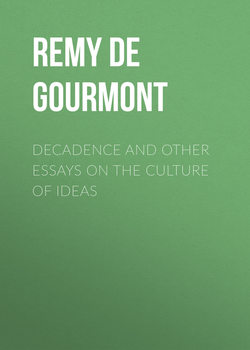Decadence and Other Essays on the Culture of Ideas

Реклама. ООО «ЛитРес», ИНН: 7719571260.
Оглавление
Remy de Gourmont. Decadence and Other Essays on the Culture of Ideas
INTRODUCTION
THE DISASSOCIATION OF IDEAS
GLORY AND THE IDEA OF IMMORTALITY
I
II
III
SUCCESS AND THE IDEA OF BEAUTY
I
II
III
THE VALUE OF EDUCATION
WOMEN AND LANGUAGE
STÉPHANE MALLARMÉ AND THE IDEA OF DECADENCE
I
II
III
CONCERNING STYLE OR WRITING
I
II
III
IV
V
VI
VII
SUBCONSCIOUS CREATION42
THE ROOTS OF IDEALISM
I
II
III
IV
Отрывок из книги
There are two ways of thinking. One can either accept current ideas and associations of ideas, just as they are, or else undertake, on his own account, new associations or, what is rarer, original disassociations. The intelligence capable of such efforts is, more or less, according to the degree, or according to the abundance and variety of its other gifts, a creative intelligence. It is a question either of inventing new relations between old ideas, old images, or of separating old ideas, old images united by tradition, of considering them one by one, free to work them over and arrange an infinite number of new couples which a fresh operation will disunite once more, and so on till new ties, always fragile and doubtful, are formed.
In the realm of facts and of experience such operations would necessarily be limited by the resistance of matter and the uncompromising character of physical laws. In the purely intellectual domain they are subject to logic; but logic itself being an intellectual fabric, its indulgence is almost unlimited. In truth, the association and the disassociation of ideas (or of images, for the idea is merely a worn-out image) pursue a winding course which it is impossible to determine, and whose general direction, even, it is difficult to follow. There are no ideas so remote, no images so ill-assorted, that an easy habit of association cannot bring them together, at least, momentarily. Victor Hugo, seeing a cable wrapped with rags at the point where it crossed a sharp ridge, saw, at the same time, the knees of tragic actresses padded to break the dramatic falls in the fifth act;1 and these two things so remote – a rope anchored on a rock, and the knees of an actress – are evoked, as we read, in a parallel which takes our fancy because the knees and the rope are equally "furred,"2 the first above and the latter below, at the bend; because the elbow made by a cable thus cast bears a certain resemblance to a leg that is bent; because Giliatt's situation is quite tragic; and, finally, because, even while perceiving the logic of these comparisons, we perceive, no less clearly, their delicious absurdity.
.....
The moral of this anecdote is that the ideas which seem to us the clearest, the most evident, – the most palpable, as it were – are, even so, not strong enough to impose themselves in all their nakedness upon the average mind. In order to assimilate the idea of the army, a contemporary brain must swathe it with elements which have only a chance or current relation with the main idea. A humble politician cannot, doubtless, be expected to adopt Napoleon's simple idea of an army as a sword. Very simple ideas lie within the reach of very complicated minds only. It seems, however, that it should not be absurd to regard the army merely as the exteriorized force of a nation, and then to demand of this particular force only those very qualities which are demanded of force in general. But perhaps even this is too simple?
What excellent opportunities the present offers for one who would study the mechanism of the association and disassociation of ideas! We often talk of ideas. We write on the evolution of ideas. Yet no word is vaguer or more ill-defined. There are naïve writers who hold forth on the Idea, with a capital I. There are co-operative societies that start out suddenly in quest of the Idea. There are people who devote themselves to the Idea, who live with their gaze fixed upon the Idea. Just what is meant by such rambling? That is what I have never been able to understand. Employed thus, alone, the word is perhaps a corruption of the word Ideal. Is the modifying term perhaps understood also? Is it a stray fragment of the Hegelian philosophy which the slow advance of the great social glacier has, in passing, deposited in certain heads, where it rolls and clatters about like a rock? No one knows. Employed as a relative, the word is not much clearer in ordinary phraseologies. Its primitive meaning is too far forgotten, as well as the fact that an idea is nothing but an image that has reached the state of abstraction, of notion; but it is forgotten also that, in order to be entitled to the name of idea, a notion must be free from all compromise with the contingent. A notion, reaching the estate of idea, has become indisputable. It is a cipher, a sign – one of the letters in the alphabet of thought.
.....